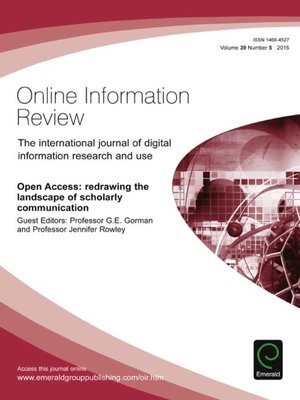Online Information Review, Volume 39, Number 5
ebook ∣ Open Access: Redrawing the Landscape of Scholarly Communication · Online Information Review
By Ralph Darlington

Sign up to save your library
With an OverDrive account, you can save your favorite libraries for at-a-glance information about availability. Find out more about OverDrive accounts.
Find this title in Libby, the library reading app by OverDrive.



Search for a digital library with this title
Title found at these libraries:
| Library Name | Distance |
|---|---|
| Loading... |
Open Access (OA) scholarly communication has been promoted as a means of achieving wider access to research outcomes, and in particular making publically available the research that has been funded by the public purse. OA proponents also point to the contradictions in the traditional scholarly communication cycle in which universities create research outputs in the form of journal articles, and then pay publishers to have access to these outputs. Research funding bodies have been keen to promote OA, and working with publishers and other key stakeholders they have developed policies, which act as a mandate for the widespread transition to an OA model of scholarly communication. However, as the implementation of this new model of scholarly communication has escalated, there has been increasing acknowledgement of its consequences for scholarly communication, particularly in the context of academic journals and their communities and publishers. Open Access publishing has been described as a disruptive innovation that may both upset the business model of scholarly publication, and also have far-reaching effects on the processes associated with the production and use of scholarly communication (Jubb, 2013; Lewis, 2012). Indeed, as Pinfield in his article in this issue states, OA can be seen as one of the most important and controversial areas of scholarly communication. Going further, Ren, also in this issue, suggests that the boundaries between scholarly communication and broader 'scholarship' are blurring such that openness is concerned not only with universal accessibility but also with widespread participation through the co-development and co-creation of knowledge. In the belief that OA is in the process of generating a major paradigm change in scholarly publishing, and more generally in scholarly communication, this e-book asks questions about the consequences for various stakeholder groups, including academic researchers, researchers in public and commercial organisations, publishers, libraries and the general public.







